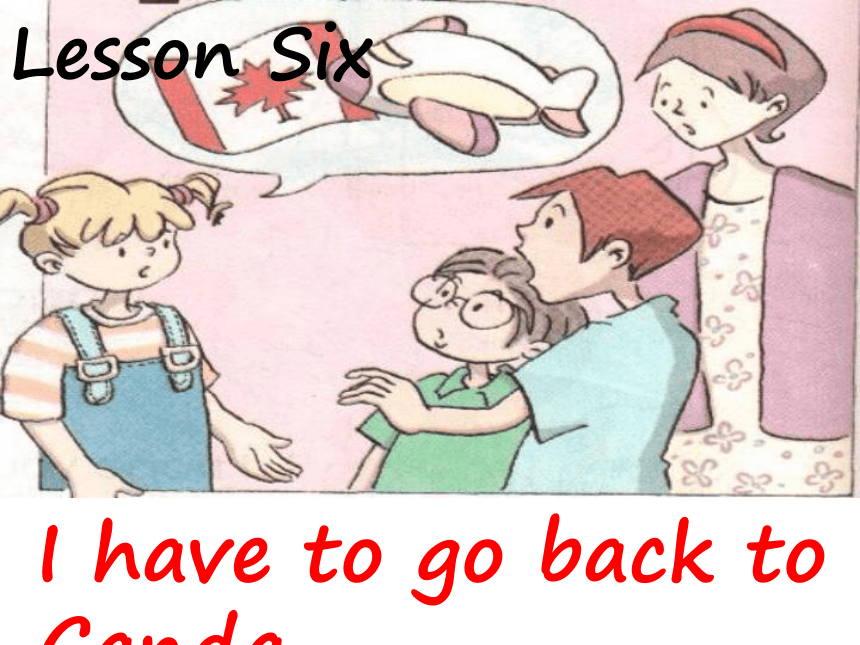
课件78张PPT。I have to go back to Canda.Lesson Sixparents父母双亲July miss想念JanuaryMarch April February May June July AugustSeptember October NovemberDecemberWhat’s up, Jenny ? Come on in.Xiaoxiao:Jenny:I have something to tell you.1.出了什么毛病?(一般指物品,有时也指人哪里不舒服) 2.有什么麻烦?(一般指事件) 3.你发生了什么事?(一般指人本身发生了的事) 4.什么情况? 根据具体情况,有时可以通用 What's wrong? What's the matter? What happened to you? What's up?有什么区别? have something to do…有某事要做1.We have a lot of knowledge to learn.我们有很多知识要学。2.You have lots of homework to finish.你们有很多作业要完成。3.She has some good news to tell you.她有一些好消息要告诉你。Xiaoxiao:Jenny:What is it?I have to go back to Canada with my parents.◆情态动词1.must意思为“必须……,得……,要……”; 肯定式:must + 动原; 否定式:must + not + 动原; 疑问式:Must + 主语……? 由must引起的疑问句,肯定回答要用must或have to,否定回答要用needn’t或don’t have to,意思是“不必”。 e.g 1.You must go home now. 2. You mustn’t smoke here. 3. Must I finish English course this term? 2. Have to 表示“不得不”、“必须”。在肯定句中,have to 随人称和时态的不同而变化。其否定式和疑问式 的构成形式与行为动词have相同,即需使用助动词。 否定: have to-- don’t have to has to -- doesn’t have to had to -- didn’t have to 都表示 “不必” Have to 的第三人称单数形式是:has to He/ She/ It/Tom/ My father/ has to Have to 和has to 的过去式:had toe.g 1). It’s too late. I have to walk home. 2). They don’t have to finish the work today. 3). He had to leave early yesterday. 4). Did he have to leave early yesterday? 3. must 与have to 的区别 must多表示主观意志,是从说话人的角度出发谈必须做某事。而have to强调客观需要。 e.g. A. I must finish my homework today. B. I have to finish my homework before lunchtime. 二者否定式的意义大不相同。Have to 的否定式表示“不必”,而must not/mustn’t表示“不准”。 e.g. A. I don’t have to finish my homework now. B. You mustn’t arrive late or you’ll get into trouble.must没有时态变化,而have to 可有不同的时态变化。 e.g. 1).We will have to leave tomorrow. 2).Tom had to finish his work yesterday. 一、请用must, need或have to的适当形式填空。 1. I’ll _____ look after my sister at home this Sunday. 2. You _____ go outside to play as it is snowing heavily. 3. We _____ be polite to our teachers at school. have tomustn’tmust4. I got up late this morning, so I _____ take a taxi to school. 5. —Does she _____ stay at home? ?—No, she doesn’t. 6. —Must I get to the station before 5 p.m.? —Yes, you _____. / No, you _____. had tohave tomustdon’t have to / needn’tgo back to回到……Please go back to your seat.请回到你的座位上去。Mike will go back to his country.麦克要回到他的国家去。Jenny has to go back to Canada with her parents.珍妮必须和她的父母一起回到加拿大去。Xiaoxiao:Jenny:Oh,no!When are you leaving?On July 10th. 离开,动身leaving(现在分词)leavebe(am,is,are)+动词的ing形式也可表示将来的动作When are you leaving?你打算什么时候离开/动身?I am leaving on July 10th.我打算 ... ...
~~ 您好,已阅读到文档的结尾了 ~~

